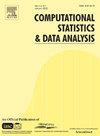Eliciting prior information from clinical trials via calibrated Bayes factor
IF 1.6
3区 数学
Q3 COMPUTER SCIENCE, INTERDISCIPLINARY APPLICATIONS
引用次数: 0
Abstract
In the Bayesian framework power prior distributions are increasingly adopted in clinical trials and similar studies to incorporate external and past information, typically to inform the parameter associated with a treatment effect. Their use is particularly effective in scenarios with small sample sizes and where robust prior information is available. A crucial component of this methodology is represented by its weight parameter, which controls the volume of historical information incorporated into the current analysis. Although this parameter can be modeled as either fixed or random, eliciting its prior distribution via a full Bayesian approach remains challenging. In general, this parameter should be carefully selected to accurately reflect the available historical information without dominating the posterior inferential conclusions. A novel simulation-based calibrated Bayes factor procedure is proposed to elicit the prior distribution of the weight parameter, allowing it to be updated according to the strength of the evidence in the data. The goal is to facilitate the integration of historical data when there is agreement with current information and to limit it when discrepancies arise in terms, for instance, of prior-data conflicts. The performance of the proposed method is tested through simulation studies and applied to real data from clinical trials.
通过校正贝叶斯因子从临床试验中提取先验信息
在贝叶斯框架中,临床试验和类似研究越来越多地采用功率先验分布,以纳入外部和过去的信息,通常是为了告知与治疗效果相关的参数。它们的使用在样本量小且有可靠的先验信息的情况下特别有效。该方法的一个关键组成部分由其权重参数表示,该参数控制纳入当前分析的历史信息的数量。尽管该参数可以建模为固定或随机,但通过完全贝叶斯方法得出其先验分布仍然具有挑战性。一般情况下,该参数应谨慎选择,以准确反映现有的历史信息,而不占后验推断结论的主导地位。提出了一种新的基于模拟的校准贝叶斯因子过程,以得出权重参数的先验分布,使其能够根据数据中证据的强度进行更新。目标是在与当前信息一致时促进历史数据的整合,并在出现差异时(例如先前的数据冲突)限制历史数据的整合。通过仿真研究和临床试验的真实数据验证了所提出方法的性能。
本文章由计算机程序翻译,如有差异,请以英文原文为准。
求助全文
约1分钟内获得全文
求助全文
来源期刊

Computational Statistics & Data Analysis
数学-计算机:跨学科应用
CiteScore
3.70
自引率
5.60%
发文量
167
审稿时长
60 days
期刊介绍:
Computational Statistics and Data Analysis (CSDA), an Official Publication of the network Computational and Methodological Statistics (CMStatistics) and of the International Association for Statistical Computing (IASC), is an international journal dedicated to the dissemination of methodological research and applications in the areas of computational statistics and data analysis. The journal consists of four refereed sections which are divided into the following subject areas:
I) Computational Statistics - Manuscripts dealing with: 1) the explicit impact of computers on statistical methodology (e.g., Bayesian computing, bioinformatics,computer graphics, computer intensive inferential methods, data exploration, data mining, expert systems, heuristics, knowledge based systems, machine learning, neural networks, numerical and optimization methods, parallel computing, statistical databases, statistical systems), and 2) the development, evaluation and validation of statistical software and algorithms. Software and algorithms can be submitted with manuscripts and will be stored together with the online article.
II) Statistical Methodology for Data Analysis - Manuscripts dealing with novel and original data analytical strategies and methodologies applied in biostatistics (design and analytic methods for clinical trials, epidemiological studies, statistical genetics, or genetic/environmental interactions), chemometrics, classification, data exploration, density estimation, design of experiments, environmetrics, education, image analysis, marketing, model free data exploration, pattern recognition, psychometrics, statistical physics, image processing, robust procedures.
[...]
III) Special Applications - [...]
IV) Annals of Statistical Data Science [...]
 求助内容:
求助内容: 应助结果提醒方式:
应助结果提醒方式:


